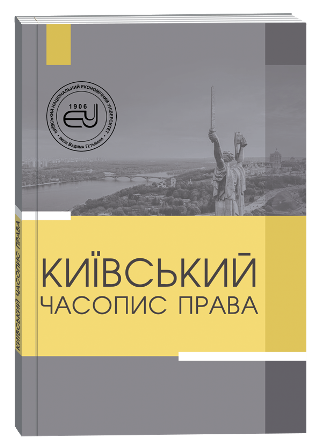IMPROVEMENT OF THE PROCEDURE FOR THE TRIAL OF CRIMINAL PROCEEDINGS WITHOUT THE PARTICIPATION OF THE ACCUSED IN CONNECTION WITH HIS REMOVAL FROM THE COURTROOM
DOI:
https://doi.org/10.32782/klj/2022.2.24Keywords:
criminal proceedings in absentia, criminal procedural form, compulsory appearance of the accused, criminal proceedings without the participation of the accused, videoconferenceAbstract
In the article, the author examines the theoretical and practical problems of the current state of legal regulation of the criminal procedural institution of the trial of criminal proceedings without the participation of the accused in connection with his removal from the courtroom temporarily or for the entire duration of the trial. On the basis of the analysis of the provisions of the current Criminal Procedure Code of Ukraine, the characteristic features of the corresponding legal concept were determined and it was distinguished from the in absentia criminal procedural form, although the presence of some common features was noted. The author stated the fact of a fairly superficial legal regulation of the procedure for removing the accused from the courtroom temporarily or for the entire duration of the trial and emphasized the significant discretionary powers of the presiding judge (college of judges) when deciding the relevant issue, which may lead to a violation of the rights and legitimate interests of the accused. In addition, the presence of only one reason for the removal of the accused from the courtroom temporarily or for the entire duration of the trial is substantiated – violation of order in the courtroom, since disobedience to the order of the presiding judge is fully covered by the category of "maintaining order in the courtroom." In order to improve the legal regulation of the relevant criminal procedural institution, it is proposed to supplement the provisions of the current Criminal Procedure Code of Ukraine, in particular, regarding the possibility to remove the accused from the courtroom for the first time only temporarily (until the stage of court debates). The need to establish "boundaries" of temporary removal (calendar period, number of court hearings, etc.) is emphasized. Repeated removal of the accused is possible both temporarily and for the entire duration of the trial at the discretion of the court. It is proposed to provide an opportunity for the accused, who has been removed from the courtroom, to view the video recording of court sessions online or in the recording in order to fully inform him about the consideration of the relevant criminal proceedings, which will ensure the availability of additional guarantees of protection of his rights and interests in criminal proceedings.
References
Кримінальний процесуальний кодекс України: Закон України від 13 квітня 2012 року № 4652-VІ // Відомості Верховної Ради України. 2013. № 9-10, 11-12, 13. Ст. 8.
Білокінь Р.М. Проблемні питання застосування видалення із зали суду порушників порядку судового засідання. Прикарпатський юридичний вісник. 2016. Вип. 5. С. 105-109.
Кримінальний процесуальний кодекс України. Науково-практичний коментар / За загальною редакцією професорів В.Г. Гончаренка, В.Т. Нора, М.Є. Шумила. К.: Юстініан. 2012. 1224 с.
Тітко І.А. Оцінні поняття у кримінально-процесуальному праві України. Харків: Право. 2010. 216 с.
Білокінь Р.М. Відповідальність за порушення порядку у залі судового засідання. Підприємництво, господарство і право. 2017. № 1. С. 214-218.
Кузьменко О., Панченко О. Особливості застосування заходів процесуального примусу в адміністративних судах головуючим у судовому засіданні. Право України. 2008. № 10. С. 31-37
Сиза Н.П., Кузьмінська Д.С. Реалізація функції захисту під час судового розгляду в кримінальному процесі України. Вісник кримінального судочинства. 2018. № 2. С. 72-80.
Ващук Б.Л. Обов’язкова участь захисника у кримінальному провадженні. Часопис Київського університету права. 2014. № 4. С. 237-240.
Кримінальний процес / За ред. В.Я. Тація, Ю.М. Грошевого, О.В. Капліної, О.Г. Шило. Х.: Право. 2013. 824 с.
Кримінальний процесуальний кодекс України: науково-практичний коментар / С.В. Ківалов, С.М. Міщенко, В.Ю. Захарченко. Х.: Одіссей. 2013. 1104 с.
Загурський О.Б. Судові дебати в кримінальному процесі: правові та психологічні проблеми: автореферат дисертації на здобуття наукового ступеня кандидата юридичних наук: 12.00.09 – кримінальний процес та криміналістика; судова експертиза // Прикарпатський університет ім. В. Стефаника. Івано-Франківськ. 2003. 17 с.
Мокрицька І.Я. Проблеми повноти, всебічності й об’єктивності судового розгляду справ про злочини неповнолітніх. Наукові записки НаУКМА: Юридичні науки. 2004. Т. 26. C. 63-67.
Черниченко І.В. Застосування відеоконференції у кримінальному провадженні України: теорія і практика: монографія. Київ: Алерта. 2015. 272 с.
Маленко О.В. Відмежування заочної кримінальної процесуальної форми від суміжних категорій. Підприємство, господарство і право. 2019. № 7. С. 200-205.







